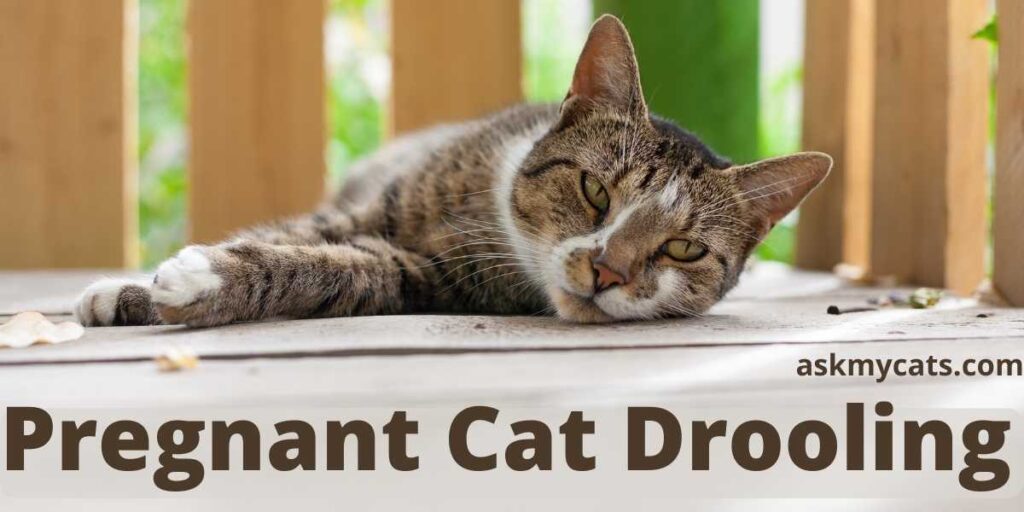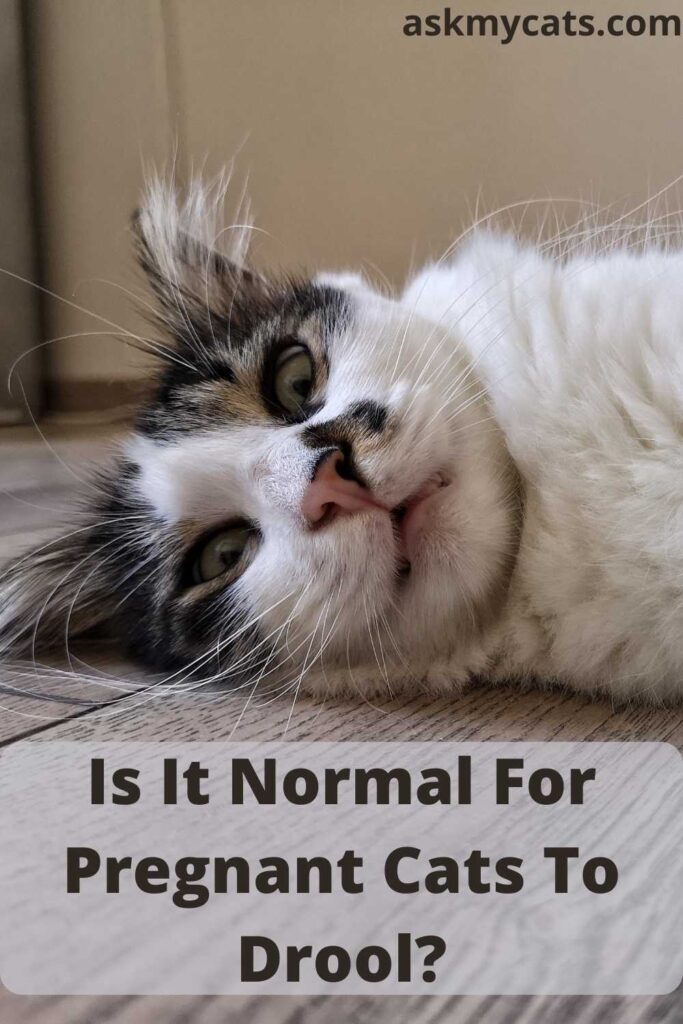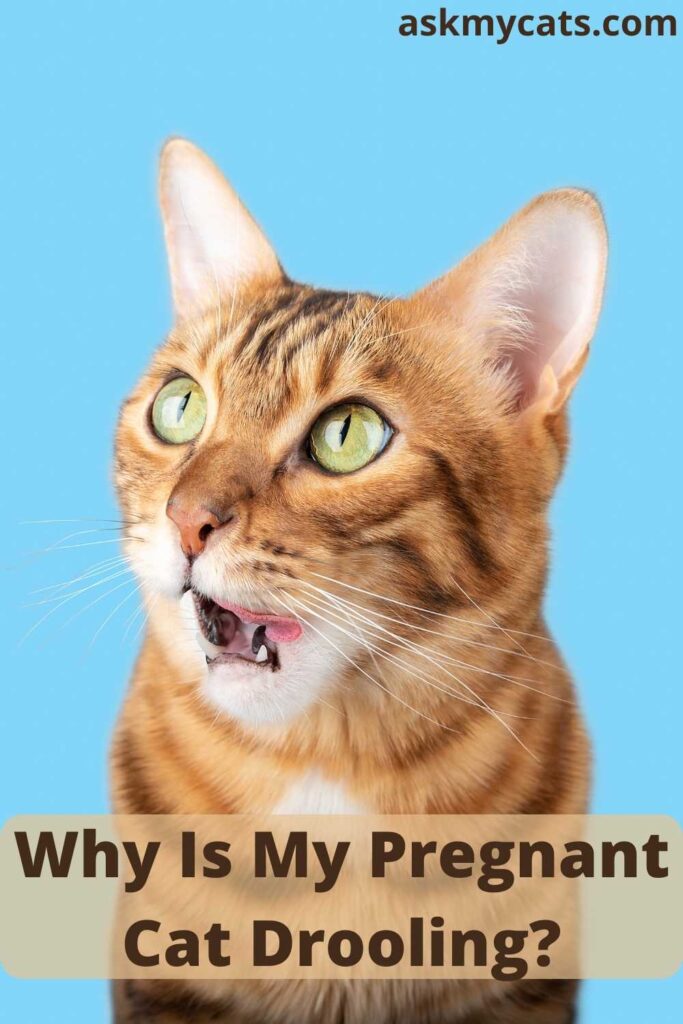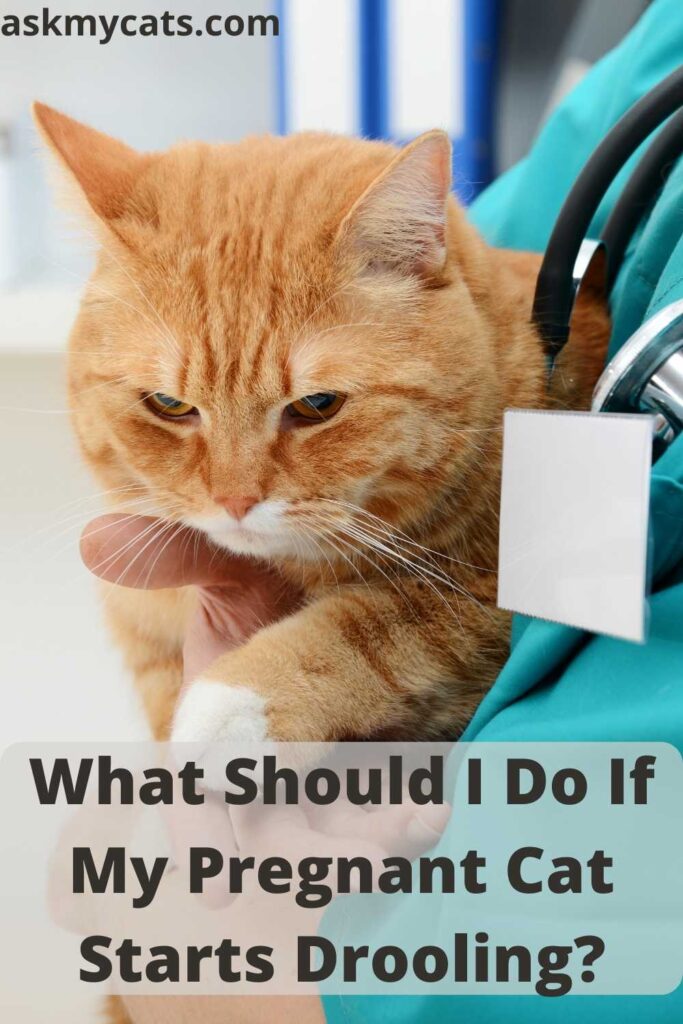It can be difficult to determine whether your pregnant cat is acting normally. For example, you may be wondering whether your pregnant cat’s drooling is normal or cause for concern.
So, why is your pregnant cat drooling?
There are many reasons behind your pregnant cat drooling like Eclampsia, something getting lodged in her throat or your cat being anxious.
Keep reading the article to know more about why your pregnant cat is drooling and how can you cure her.


Give Your Cat the Perfect Day
Get the Free Ebook!
Is It Normal For Pregnant Cats To Drool?
Yes, it is normal for pregnant cats to drool, if they are doing it from kittenhood and not suffering from any underlying disease.

Drooling by cats when they are happy and relaxed, such as when being petted, is normal behavior.
These cats typically develop this behavior early in life, so it would be unusual for an older cat to suddenly begin drooling if they had not previously.
If this occurs, contact your veterinarian to discuss your cat’s sudden drooling.
It’s not uncommon for some cats to drool while kneading or purring.
Drooling is a sign of contentment and relaxation that can be traced back to kittenhood.
While nursing, kittens frequently knead their mothers’ paws to stimulate milk release. These behaviors result in a nourishing bond between mother and kitten as well as a comforting and satisfying meal.
When cats reach adulthood, feelings of contentment frequently lead to kneading, which stimulates drooling due to the association with nursing.
Purring frequently accompanies kneading and drooling.
Don’t be surprised if your otherwise healthy pregnant cat starts drooling and purring while sitting in your lap.
This is perfectly normal, and it is most likely one of the ways your pregnant cat shows you love.
Pregnant cats, unlike dogs, do not frequently drool at the sight of food. However, it is still possible.
If your pregnant cat drools at the sight or smell of food but not at other times, you shouldn’t be concerned.
Drooling may occur temporarily as a result of stress or fear, such as during car rides, vet visits, or loud events.
If your pregnant cat appears to be extremely stressed on a regular basis, consult with your veterinarian about your options.
If the drooling and stress are brief and go away on their own, there is probably no need to be concerned.
If your pregnant cat drools all the time, she may have a health problem. This is especially true if the drooling is unrelated to happiness or food.
Even if they appear healthy, all pregnant cats should be seen by a veterinarian at least once every 2-3 months for routine wellness exams.
The vet can frequently detect problems before your pregnant cat exhibits any symptoms.
If you notice unusual drooling between routine vet visits, you should contact your doctor right away.
Your pregnant cat may require medical attention. There are several medical conditions that can cause drooling in pregnant cats and necessitate medical attention.
Why Is My Pregnant Cat Drooling?
Here are some reasons why your pregnant cat may be drooling: –

1. Eclampsia
Eclampsia, also known as hypocalcemia or puerperal tetany, is a medical emergency caused by a life-threatening drop in blood calcium levels in nursing mothers.
Eclampsia is most common between the ages of one and four weeks when the mother is producing the most milk.
It can also happen prior to giving birth. The indications are initially subtle.
The female may be restless or panting, and drooling heavily, leading to her inability to walk.
This quickly leads to muscle spasms (tetany) affecting the entire body, which can quickly lead to convulsions.
Some affected cats may develop a fever, become disoriented, aggressive, restless, and excessively paced.
Eclampsia is a life-threatening medical condition. If you suspect eclampsia is developing, contact your veterinarian right away.
Eclampsia is a condition that affects pregnant or nursing cats.
The condition is most common four weeks after giving birth, but it can occur at any time before or after a month.
The following are common causes of feline eclampsia:
- Lactation, the production of milk, sourcing the blood calcium to be delivered to the nursing kittens
- Poor nutritional absorption through the digestive system, eliminating the calcium mineral rather than captivating it
- Insufficient diet consumed by the pregnant or lactating queen
- Pregnancy, as a substantial sacrifice of blood calcium is required to support fetal development.
- Large litters of kittens, as the mother must lactate in great volume to support the needs of her offspring.
Eclampsia in cats is a life-threatening emergency; therefore, veterinary professionals are trained to recognize the clinical signs.
The first diagnostic test, known as a physical examination, will be the behavior your cat exhibits and notice the excessive drooling.
To establish a diagnostic baseline, the feline doctor will review your cat’s medical record for allergies, drug reactions, and previous illnesses.
Expect your veterinarian to ask you a number of questions about the feline, such as her symptoms, a time frame for clinical signs, and the date she gave birth.
A biochemistry profile will most likely be requested to reveal hypocalcemia in the cat’s blood in order to obtain a direct diagnosis.
2. Medical Condition
If your pregnant cat is drooling, it could be due to a medical condition. When cats are in pain, they drool.
Stomatitis, an inflammation of the mouth and lips, could be present in your cat. Inflammation could mean your pregnant cat has a mouth infection.
Drooling in pregnant cats can be caused by gum disease and abscessed teeth. A discussion with your veterinarian is necessary.
Tartar buildup can cause your pregnant cat to slobber by rubbing on the inside of its lip. Pull their lip back toward their ear to check.
Do their teeth resemble concrete? Are they dark brown? Are their gums red, swollen, or bleeding?
Try a professional cleaning first, followed by daily brushing. Have your vet check for gingivitis, mouth ulcers, and tumors.
Cats are more likely to become ill as they age. Drooling can also be caused by liver and kidney disease.
Annual checkups are recommended by veterinarians to detect and treat such diseases as early as possible.
Drooling can indicate a sinus, nose, or throat infection. Pregnant cats who live in homes or shelters with other pets are more vulnerable. Another factor is stress.
Toxin exposure and organ disease can cause nausea, which can lead to drooling.
Infections should only be treated by your veterinarian.
You can, however, take precautions to keep your pregnant cat from getting one: Keep them vaccinated, indoors, and away from other pets, and wash your hands after handling different animals.
3. Your Cat Has Something Lodged in Her Throat
Something is stuck in your pregnant cat’s throat or esophagus.
If your pregnant cat has access to houseplants or goes outside, she could have eaten a plant leaf, a blade of grass, or something else that became lodged in her mouth or esophagus.
A foreign body in these areas will make swallowing difficult for your pregnant cat, and she may drool in response. Consult your veterinarian if you believe this has occurred.
Interesting Read: Cat Acts Like Something Stuck In Mouth
4. Bad Taste
If your pregnant cat has eaten something unpleasant, she may also drool. Pregnant cats typically vomit after ingesting poison.
However, if they have eaten something that simply tastes bad, they may drool to get rid of the taste (in the same way you might drool if you taste something bad).
Consult with your veterinarian if your pregnant cat is drooling abnormally.
Interesting Read: Do Cats Throw Up When Pregnant?
5. Your Cat Is Anxious
If you put your pregnant cat in a carrier and drive her to a vet appointment, she may drool because she is terrified of, well, so many aspects of that scenario.
If your pregnant cat gets overly excited about something, she may drool. Pregnant cats dislike change in general, and something unusual, such as a car ride, may increase their anxiety levels as well as their salivary glands.
If this occurs, simply wait out the stressful situation, and your pregnant cat will stop drooling.
Drooling can be caused by fear alone. Your pregnant cat may drool excessively if she feels threatened.
If possible, get her to a safe place away from the stressor, and she will stop drooling once she feels safe again.
6. Nausea
A nauseous or vomiting pregnant cat will frequently drool profusely. Internal parasites, kidney disease, and gastrointestinal conditions can all cause nausea and vomiting in cats.
If your pregnant cat appears nauseous, is vomiting, or has a poor appetite, it is best to consult a veterinarian.
Following the examination, your veterinarian may recommend lab work to gain a better understanding of organ function, blood cells, and urine content.
The findings can aid in determining the next steps in diagnostics and treatment options.
7. Toxin Exposure
Excess salivation can occur in pregnant cats who have licked, chewed on, or consumed a poisonous substance.
Poisonous plants, caustic chemicals, and toxic foods are examples of this.
Some topical toxins, such as pesticides or flea and tick preventatives that are not intended for pregnant cats, can also cause drooling.
If you suspect your cat has been exposed to something toxic, take her to the nearest open veterinarian as soon as possible.
If you notice something else in your pregnant cat’s mouth, use caution before attempting to remove it.
You may not only injure your pregnant cat further but you may also be bitten! It is always best to seek medical attention for an oral foreign body.
What Should I Do If My Pregnant Cat Starts Drooling?
The best thing you can do if you notice your pregnant cat suddenly starts drooling is to take her to the vet as soon as possible.

Pregnant cats are not prone to drooling in general.
Because hypersalivation is uncommon, getting a veterinary evaluation is the best course of action to determine whether it is harmless or serious.
The earlier a health problem is identified, the more likely it will be successfully treated.
If mouth injuries are not treated promptly, secondary bacterial infections can develop.
A pregnant cat may salivate or drool for a variety of reasons.
While drooling is a normal bodily function, excessive drooling, also known as hypersalivation, can be dangerous.
Normal drooling in pregnant cats is usually accompanied by excitement or pleasure. Drooling that is abnormal appears suddenly and can last for hours.
Overheated pregnant cats may begin to hypersalivate. Certain diseases, injuries, and viruses can also cause excessive drooling in pregnant cats.
When bringing your pregnant cat to the vet, be sure to include the cat’s complete medical history to help the vet rule out any underlying causes of excessive drooling.
The veterinarian will conduct a thorough physical and oral examination. For the oral examination to be successful, the pregnant cat may need to be sedated.
All signs will be recorded and compared to potential health issues. The veterinarian will examine the mouth for obvious injuries, abscesses, foreign objects, or masses.
A complete blood count to detect anemia or the presence of cancer, as well as a biochemical profile to detect signs of metabolic disease, will most likely be recommended.
Urinalysis can help determine how well the kidneys are working. A bile acid blood test will reveal how well the liver is working.
Urine cultures may reveal bacterial infections that are present in the body. Ultrasounds or X-rays may be used to evaluate organ health or to locate tumors or lesions in the mouth or body.
Any masses discovered may necessitate a biopsy.
The best course of treatment will be based on the underlying issue that has been identified. Treatment is only necessary if a health problem is present.
Frequently Asked Questions
How quickly can pregnant cats recover from excessive drooling?
The prognosis is heavily influenced by the type of health problem that has been identified. Surgical repair, cleaning, and a good oral health routine usually resolve dental issues.
Recovery from poisoning is heavily dependent on how quickly the poisoning was identified and what substance was consumed.
The prognosis of kidney and liver disease is uncertain, and treatment is often required for the rest of one’s life. The majority of cats will recover from an upper respiratory infection.
If a virus is the underlying cause of the infection, it may remain in the cat’s system indefinitely.
Why do some pregnant cats drool when you pet them?
Some pregnant cats drool when they are petted because they are content. They may associate the owner’s affection with the contentment they felt while nursing their mothers as kittens.
This is normal behavior for pregnant cats, and they may also purr, knead their paws, and/or rub their face/body on you or your furniture.
When should you call the vet about a pregnant cat drooling?
Contact your veterinarian if your pregnant cat has drooling that is accompanied by bad breath, Lack of or decreased appetite, Vomiting, Weight loss, Upper respiratory signs (sneezing/nasal discharge), and Lethargy.
Final Words
If you notice that your pregnant cat has started drooling all of the sudden, the best course of action would be to get her to the vet and get the treatment started as soon as possible.
If you have any questions, ask us in the comments section.
